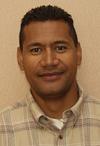Samoan islands 'dropped from Heaven'

No matter what anthropologists or geologists may claim, the Samoan islands were dropped from Heaven by God.
At least that’s what the proud Polynesian people who inhabit the islands prefer to believe, according to Dr. Ottley Wright, a physical education professor at Chadron State College. He discussed his homeland during the final Phi Alpha Theta History Fraternity program of the school year at CSC last week.
Wright is a native of what was formerly called Western Samoa, but is now officially known as plain Samoa, an independent nation about the size of Rhode Island with a population of 180,000. To the east, there’s American Samoa, a U.S. territory which has sent dozens of youths to Chadron State in the last 40 or so years, but has none currently enrolled.
American Samoa has about 80,000 people living on a considerably smaller land mass than Samoa. Located near the equator, the islands are muggy.
Wright said the first inhabitants arrived about 1000 B.C, probably by rafts from Peru. Dutch and French explorers spotted the islands in the 1700s, but were afraid to go ashore. Finally, in 1830, English missionaries John Williams and Charles Barf went ashore and converted nearly everyone to Christianity. He said God is still at the forefront of the culture. American Samoa’s motto is “Let God Be First.” Samoa’s is “Founded on God.”
Wright said most of the businesses and offices are closed on Saturdays so the people can get ready for church. Then absolutely everything closes on Sundays and the churches are packed.
The families are large and share their possessions. He is one of nine children, and said that is about the average family size, but some have as many as 20 by the same mom and dad. Building permits are not needed, and the newlyweds often construct a small home only 10 or so feet from one of their parents’ homes.
While the women are busy bearing children and tending to them, men do nearly all the cooking, Wright stated. The process often includes shinning up a coconut tree and then husking the fruit, both of which require considerable strength.
Samoa has a “strong code of conduct,” and family members who deviate are outcasts. Village chiefs can decide if someone should be forced to leave. Children are taught never to question their parents, Wright said. Even those who marry are under the authority of their parents.
Because of the “code of conduct,,” Wright said youths who leave the islands for an education often have a difficult time when they return. He said the suicide rate is high.
Wright attended Brigham Young-Hawaii, where he met his wife, Traci, a native of Lyons, Colo. After graduating, they returned to teach in Samoa. Three years later, he enrolled at the University of Northern Colorado, where he earned both his master’s degree and doctorate. This is his first year at CSC.
Category: Campus News
